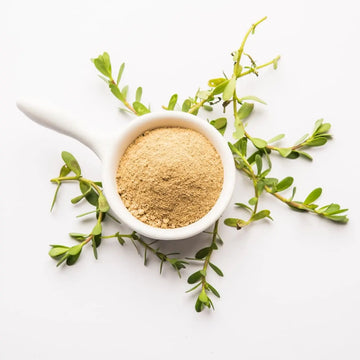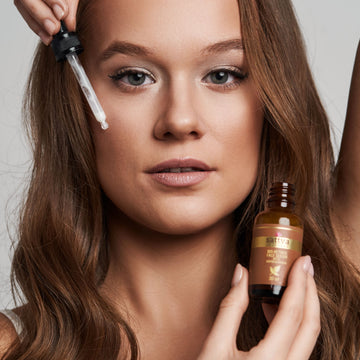Effective Ways to Regulate Sweating (and Odor)
Why do we sweat?
Ayurvedic writings emphasize the positive and even healing aspects of sweating. Swedana , or various diaphoretic rituals, are used as an essential element in the process of cleansing the body, Ayurvedic detox called panchakarma . Through sweat, we remove toxins from the body, i.e. things that are unnecessary to the body and should not be deposited in the tissues. Sweat is primarily an element that we excrete in the metabolism process. (so-called mala) . Sweating helps regulate body temperature, the body cools itself in this way, for example during sports or on hot days. Sometimes excessive sweating is associated with a medical cause (such as some diseases, nervous disorders or symptoms related to menopause).
The most important causes of excessive sweating and unpleasant odor
Here are some factors that contribute to excessive sweating in healthy people that are worth knowing about.
- Prakriti (Ayurvedic for "genetic code", individual dosha constitution) - It is worth noting that people with different Ayurvedic constitutions sweat differently. People with a dominant Pitta dosha sweat profusely and unfortunately, it is often accompanied by an unpleasant odor, due to increased activity of their apocrine sweat glands (located where body hair occurs). The amount of sweat is also influenced by the level of hydration, people with a dominant Pitta constitution feel increased thirst due to the need for greater thermal regulation.
- Emotions (such as fear, sadness, anger) lead to higher activity of the sympathetic nervous system, which causes more sweating, especially in people with a dominant Vata dosha and Pitt.
- Excessive physical activity - physical activity, sports increase metabolism and increase heat production. This in turn results in increased sweating to regulate temperature.
- Obesity - due to the distribution of adipose tissue in obese people (excessive fat deposition in the subcutaneous layer), heat release is difficult. In these people, heat loss occurs mainly in the hands and feet - this is where increased sweating occurs.
- Lack of proper hygiene - this is the cause of bad odor. Sweat becomes a breeding ground for bacteria.
How to Control Sweating and Reduce Bad Odor
It is worth remembering that there are simple ways to reduce the severity of the problem. Here are some tips and rituals to implement if you are suffering from excessive sweating:
- Practice sports wisely, i.e. moderately , not to the max of your abilities. Moderation means different things to different people. In addition, in pitta people, excessive physical exercise can more easily lead to overheating, and consequently - excessive sweating (which regulates body temperature). In such cases, it is worth training in the cooler hours of the day instead of at noon. Ayurveda recommends the approach of continuing exercise or sports until the first sweat appears. In different people, the moment when sweat appears will occur at a different time.
- Pay attention to your diet - spicy spices, as well as onion and garlic increase agni (body heat) and also cause bad odor. So try to limit them in your diet (especially do not eat them for breakfast or dinner, and possibly in the evening). Also try soak the cilantro overnight and after straining the grains, drink the water the next morning. Another natural trick is to consume in the morning a few (also soaked overnight) raisins . Amla, the so-called Indian gooseberry can also be effective in controlling sweating. You can consume it in the form of juice or capsules, for example.
- Oiling the scalp with herbal remedies cooling oils has a relaxing effect - use brahmi amla oil, which has such an effect.
- Control your stress and emotions - try the practice of controlled breathing (so-called pranayama) and meditation. This will lower your stress level and reduce sweating.
- For daily body oiling (abhyanga), use a Pitta-cooling Ayurvedic oil.
Hygiene for excessive sweating
Hygiene first and foremost. Remember, especially in the warm season and after physical exertion, to wash your whole body every day to prevent the multiplication of bacteria causing - among other things - unpleasant odour . Sweat is a favourite breeding ground for bacteria. You should also dry yourself thoroughly after bathing, because bacteria love a moist environment. In addition, choose clothes made of natural, breathable fabrics and such body-friendly underwear, this is especially important in the summer.
Choose a natural deodorant without aluminum salts
Why Choosing a Deodorant is Important
As you already know, the process of sweating is a necessary process that should be regulated, not blocked. Make sure your deodorant contains natural ingredients, such as essential oils, plant extracts, and minerals. Avoid products with aluminum, parabens, and artificial fragrances. Natural deodorant without aluminum is a product that neutralizes unpleasant odors without containing harmful aluminum salts. How natural deodorants work They are based on neutralizing unpleasant odors using natural ingredients, such as essential oils or plant extracts. Thanks to this, they do not block the sweat glands, but only mask the unpleasant odor.

Sattva Ayurveda natural deodorants without aluminum
Sattva natural deodorants in the form of a body mist are made with bamboo leaf water and are available in three fragrances (opium, patchouli and night queen). They are gentle on the skin and provide gentle care and comfort. You can choose a perfume oil with the same fragrance note for each of the three fragrances.




